Airlines Could Start Facing Legal Challenges Over Withholding Refunds
Skift Take
Frustration is mounting over the amount of refund money airlines are holding — with one global corporate travel agency threatening to take legal action.
It's also claimed the situation is exacerbated by airlines increasingly switching from global distribution systems to the International Air Transport Association's billing and settlement process to carry out these refunds.
Since the crisis began, Norway’s G Travel has furloughed 400 employees of its 550-strong workforce, and has decided to use the courts to force airlines into returning its cash.
Get the Latest on Coronavirus and the Travel Industry on Skift's Liveblog
“We are considering taking them to court to secure the money,” Finn Hansen, CEO of G Travel, told Skift. “You can do that easily in Norway. It can be handled quite fast by the courts to secure the money, both for us and our clients. We will start with one airline to have the courts look into it, and see the results from that one. I think we are the first agency to take this into consideration right now.”
G Travel, which has an annual turnover of $440 million, is one of a growing number of companies running out of patience with airlines.
Refund plea
The upcoming legal challenge follows Monday's statement from UK travel trade association ABTA that urges the government to take "strong enforcement action against airlines who flout the law by withholding refunds due following the cancellation of flights."
A series of calls were also made last week by agencies and trade associations that are piling pressure on IATA to accelerate refunds.
But little has changed. “It’s the same message, but it’s getting louder,” said Clive Wratten, CEO of the Business Travel Association, which last week accused IATA of breaking its own regulations.
He said there is now “a lot of noise coming out of corporates” that want their money back following mass cancellations by airlines. However, with many companies having to lay off or furlough employees, there are concerns any refunds will take even longer.
“The lack of refunds is quite serious because now we have to register everything in BSPLink, which is a 100 percent manual system, at the agency end as well as the airline,” added G Travel’s Hansen. “We have all dismissed a lot of people in the last few weeks, and there is no one left on the airlines’ side to handle these massive refund requests.”
Wratten agreed: “The volume of refund emails is increasing. It’s costing our members money to keep people on to process BSPLink refunds. We’re also assessing how many of those airlines carry out refunds using call centers in India, because the shutdown in India will impact this. What if everything is outsourced to India?”
'Negative BSP'
Meanwhile, questions have been raised over whether IATA’s billing and settlement process is technically able to place money back into agencies’ bank accounts. Hansen claims a “negative BSP” is not possible.
“Billing & Settlement Process cannot go into the airline’s bank account to take the money, so IATA has to raise an invoice, telling them to pay it before they can pay it to the travel agents. My guess is they’re not going to pay that money,” he argued.
Wratten said the situation is without precedent, as refunds tend to be deducted from any money owed by the agency to the airline. “The Billing & Settlement Process return payment date is today — the question is whether airlines actually do refund back this way,” he said.
In a statement to Skift last week, IATA said it had already encouraged its airline members to facilitate any claim for reimbursement. "But given the current liquidity situation this is a business decision for each individual airline and is outside of IATA’s scope. IATA has also reminded airlines that in some jurisdictions agents are required under law to provide refunds to passengers," it added.
stand together
While G Travel’s test case may ruffle feathers in Norway, UK-based agencies will be hard pressed to make it to court, according to one lawyer specializing in the sector.
Stephen Mason, senior counsel at Travlaw LLP Solicitors, told Skift: “If anyone’s trying to improve their cash flow with an action like that in the UK, there’ll have a long wait because the courts are in disarray at the moment. It could be months before anything happened, unless it was a dire emergency. This wouldn’t be counted as an emergency.
“The courts were already struggling to deal with matters in a timely manner before this crisis arose. And with the crisis, there are huge delays built into the system.”
Legal action could also harm an agency’s reputation, according to one consultant.
“The only way through is to work together, to stand by each other,” said Kate Suddards, director at Bollin Consultancy. “Agencies have heavily invested in their supplier relationship teams and being a valued supplier partner is much deeper than just the commercial contract.
“Many airlines are extending flexibility around the ticket conditions, however others sadly not. Those that remove complexity in the refund process and demonstrate compassion are likely to reap the loyalty of both the customer and agency in the long term and be a more favorable position once we begin to see the uplift.
“I'd be surprised if we were to see legal action on such a scale take place by the agencies themselves, this would require significant investment and likely be complex. It could potentially force a carrier into extinction.”




